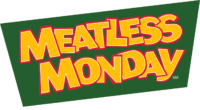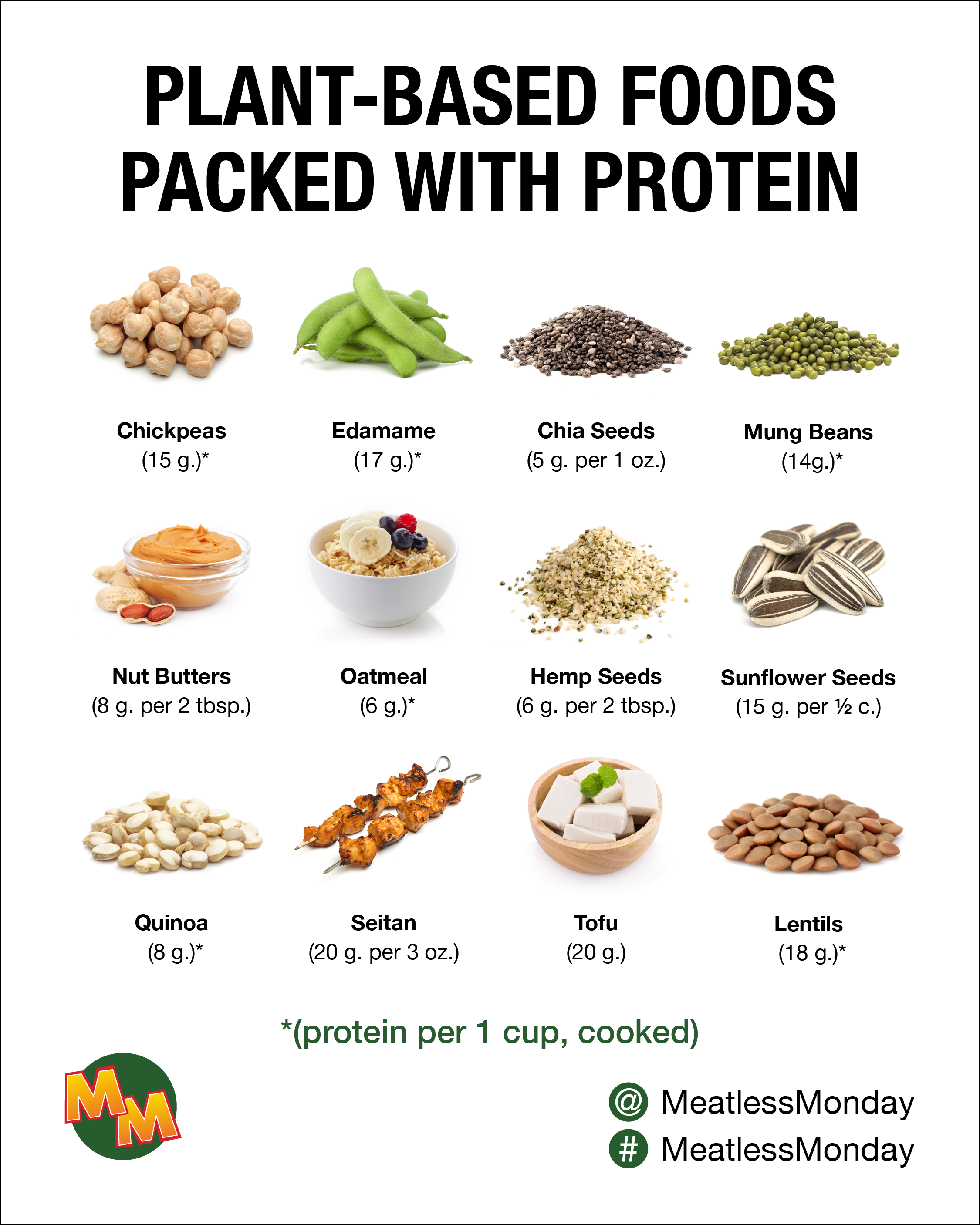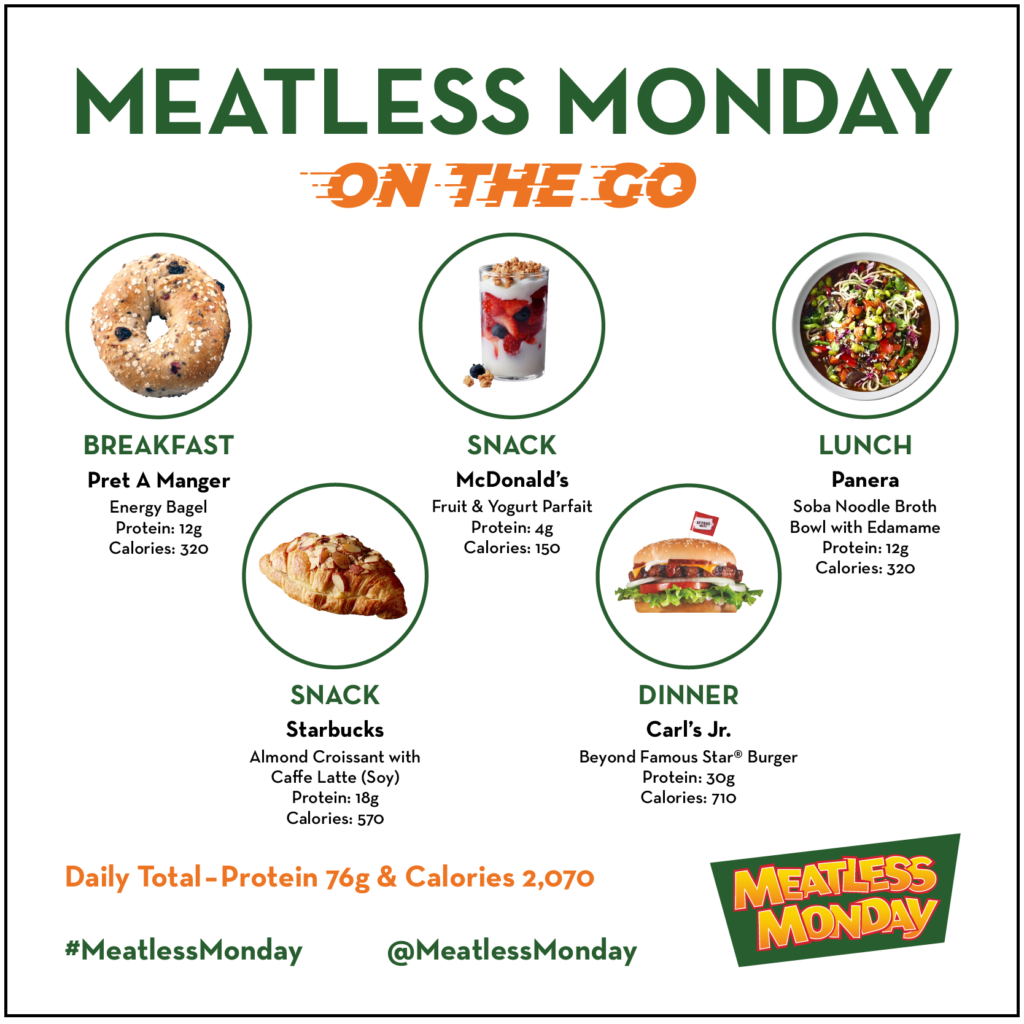Top 20 Plant-Based Proteins
“Will I get enough protein?” is one of the most common questions asked by people looking to add more plant-based foods to their diet.
The short (and long) answer is — YES.
According to the United States Department of Agriculture (USDA), the recommended dietary allowance for individual daily protein intake is 0.8 grams per of protein per every 2 pounds of body weight. Although this is an approximate calculation — other factors such as age, sex, body type, and lifestyle must be considered for a precise nutrient recommendation — it provides a reliable benchmark to measure your daily protein requirements.
This amounts to around 56 grams of protein per day for the average sedentary man and 46 grams per day for the average sedentary woman.
So, how do you reach that daily number eating only plant-based foods?
Easy, check out our guide below and discover which seeds, nuts, legumes, vegetables, and plant-based products pack the biggest protein punch.
Still have questions? Learn more about plant-based protein from the nutritional experts at Johns Hopkins University.
Broccoli
One of the most popular vegetables is also one of the most protein dense, with one cup of cooked broccoli containing 2.5 grams of protein. Roast it, sauté it, or steam it for a quick and nutritious side dish.
Chia Seeds
Small but mighty, 1 ounce of chia seeds packs nearly 5 grams protein. Drop a spoonful into a smoothie or combine with a liquid like juice or nut milk to make a fun-textured chia pudding.
Chickpeas
Cooked chickpeas are the main ingredient in hummus and boast nearly 15 grams of protein per cup. And remember, when using canned chickpeas, save the liquid — also known as aquafaba — for a terrific, plant-based egg white replacement.
Edamame
Popular in Japan and other areas of East Asia, edamame is as close you can get to a perfect food: One cup of cooked edamame contains 8 grams of fiber, 17 grams of protein, and is only 189 calories.
Farro
One of the lesser known “ancient grains,” farro needs to be on your radar. A quarter cup of uncooked farro contains 6 grams of protein. Its toothsome texture adds a pleasant chew to grain bowls and salads.
Frozen Veggie Burgers
There are tons of different types of pre-made frozen veggie burgers varying in ingredients, texture, and flavorful, and although their nutritional profiles differ, you can generally expect between 10 – 15 grams of protein per patty. Try a range of brands and see which one(s) fit your palate.
Hemp Seed
Heralded as a “superfood,” hemp seeds have a subtle, nutty flavor similar to pine nuts. In baking, hemp seeds can be used as a nut replacement, but it can also be added to smoothies, with 2 tablespoons containing over 6 grams of protein.
Jackfruit
Jackfruit is often marketed as a plant-based alternative to pulled pork, with a meaty, stringy texture fit for faux barbecue platters and sandwiches. Jackfruit is rarely sold whole, but there are a handful of brands selling products made with jackfruit in the refrigerated section of supermarkets. Jack fruit is not the most protein-dense item on this list, but it still contains 3 grams per cup.
Kidney Beans
These hefty beans are dense, nourishing, and nutrient-packed. One cup of cooked kidney beans contains roughly 13 grams of protein (as well as 13 grams of fiber).
Lentils
With tons of fiber and almost no saturated fat, look to use lentils as the foundation of multiple meals throughout the week. A cup of cooked lentils contains 18 grams of protein and more than half your recommended daily value of fiber.
Mung Beans
Mainly cultivated in East and Southeast Asia, the mung bean is often used as the foundation of stews, vegetable patties, or dal. One cup of cooked mung beans contains 14 grams of protein. Note: mung beans are easier to find dry rather than cooked and canned.
Nut Butters
Although not all nut butters are considered equal when it comes to protein content (or flavor), they generally contain around 4 grams of protein per tablespoon.
Oatmeal
A cup of cooked oatmeal contains 6 grams of protein; pair it with a scoop of peanut butter and a sprinkling of hemp or chia seeds for a protein-packed breakfast.
Plant-Based Meat
Thanks to plant-based meat, sources of vegan protein are all the rage. A typical plant-based burger patty contains 20 grams of protein. Many quick-service restaurant chains now offer versions of their classic menu items featuring some variety of plant-based meat.
Quinoa
The trendiest of grains (well, it’s technically a seed), quinoa is a splendid source of protein that can serve as the foundation of any meatless meal. A cup of cooked quinoa boasts around 8 grams of protein.
Seitan
The original plant-based meat replacement, seitan — which is made from wheat gluten — is packed with protein and can be quite tasty when properly prepared. A 3-ounce serving of seitan includes between 15 – 20 grams of protein, a number that is comparable to most animal proteins.
Soy Milk
The market for non-dairy nut milks has exploded in recent years, but soy milk remains the most nutritious option. One cup of soy milk has 8 grams of protein, which makes it a nice base for smoothies and shakes.
Sprouted Bread
Sprouted bread is a certain category of bread made from grains that have been allowed to germinate (aka sprout) before being milled into flour. Ezekiel Bread — a common brand of sprouted bread — contains 4 grams of protein and only 80 calories per slice.
Sunflower Seeds
Who would’ve thought that the innocent little sunflower seed could pack such a protein punch? A half-cup of sunflower seeds has 15 grams of proteins. Bring some in a little baggy and keep with you for a quick and nutritious snack.
Tofu
There are imitators and then there are originators. Tofu — made from soy beans — is sold in a variety of textures and forms, but no matter the type, you’re guaranteed to get a solid dose of plant-based protein, with a half-cup offering around 10 grams. Our recipe for Jamaican Jerk Tofu (the most popular recipe on our website) will make you a lifelong tofu loyalist.
Below, we’ve curated a sample a menu to demonstrate how easy it is to hit your daily protein target eating only plant-based foods.
Breakfast: Overnight Pumpkin Pie Oats (17 grams of protein)
Lunch: Garlicky White Bean Avocado Toast (13 grams of protein)
Dinner: Veggie Meatballs (27 grams of protein)
No time to cook? No problem. Meatless Monday On-the-Go is easier than ever.
Creating a plant-based Meatless Monday masterpiece? Let us know by tagging @MeatlessMonday and #MeatlessMonday on your social media posts for a chance to be featured on our channels.



